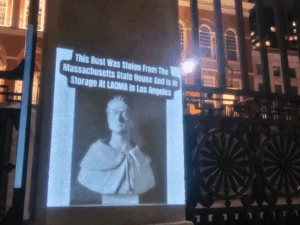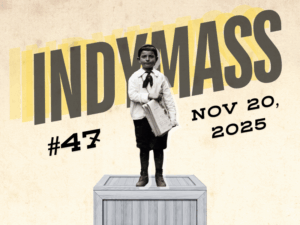The Quiet Few in East Boston radically altered its business model since the start of the pandemic
“It’s very reasonable, it’s very measured, it’s not going to stop anyone from getting their favorite vodka or tequila at the liquor store.”
Massachusetts is often considered a leader on national issues. But on one timely topic, the Commonwealth is demonstrably lagging: allowing for the sale of takeout cocktails during the COVID-19 pandemic. As some stakeholders explain, it’s one of many measures that are needed to help lift the hospitality sector.
According to a June 17 statement distributed by the Distilled Spirits Council of the United States (DISCUS), 28 states and Washington, DC currently allow bars and restaurants to sell takeout cocktails or spirits. Mass is not among them.
“Pennsylvania’s the worst state in the country to do what I do,” Jackson Cannon, bar director of the Hawthorne, said in an interview. “When Pennsylvania got it, I went nuts. The morning I woke up to Pennsylvania doing it, I thought, ‘What do I have to do?’”
What Cannon did was help organize a social media campaign dubbed #cocktailsforcommonwealth, urging supporters to call their state legislators to express their support for takeout cocktails.
“This is something that we needed at the beginning, this is something that we need now, this is something we need for years,” Cannon added.
Working with state lawmakers, Cannon went on to contribute language to An act addressing challenges faced by food and beverage establishments resulting from the COVID-19 pandemic, which specifically acknowledges takeout cocktails. According to the measure, establishments already licensed to sell alcoholic beverages for on-premise consumption can sell mixed drinks in sealed containers of up to 64 ounces in volume with food.
Cannon described this approach—which does not allow establishments to sell spirits in their original, sealed containers, as is the case in states including New York, Colorado, and Kentucky—as a middle-of-the-road compromise.
“It’s a pretty modest approach,” he said. “You can sell a double pitcher’s worth if you look at it that way, by volume. It’s very reasonable, it’s very measured, it’s not going to stop anyone from getting their favorite vodka or tequila at the liquor store.”
In practice, Cannon said the bill can have a significant impact on bars and restaurants participating in takeout, which he estimates could earn 10 to 15% more in sales if the measure is enacted. The legislation would expire on February 28, 2021, which Cannon said is a shorter sunset than what other states have allowed (a proposed bill in Colorado would extend that state’s takeout cocktail measure until July 2022).
Another bill, which would also allow restaurants to delay their payment of meal taxes and cap the amount that third-party delivery services can charge restaurants, among other things—passed the House unanimously on June 3. It was read by the Senate the following day, and referred to the Senate Committee on Ways and Means. It has remained there since, leaving Cannon frustrated.
“Things can stay in committee to die,” he said. “That’s a fact of life. You spend a little time on the State House website and you see all these great ideas that pass the House and never got considered in the Senate. And this might be one of them.”
In the meantime, Cannon continues to apply pressure.
“I have managed a call campaign,” he said. “We’ve called every senator and it has overwhelming support in the Senate. Overwhelming. But not enough to get it out of the committee, I guess.”
Responding to a question for this article, a spokesperson for Senate Committee on Ways and Means Chair Michael J. Rodrigues noted, “the Committee is diligently reviewing the bill and talking to stakeholders about the effects of the legislation.”
In the meantime, workers and owners in Boston’s hospitality industry are doing whatever they can to survive.
“Frozen Margaritas are keeping my buddies in Brooklyn alive,” said Josh Weinstein, a Boston native who returned from New York to open The Quiet Few in East Boston last April. It started as a whiskey bar but radically altered its business model since the start of the pandemic.
Pre-coronavirus, Weinstein estimates that his business was 75% alcohol (including wine, beer, and liquor) and 25% food. Now it’s flipped to 75% food and 25% wine and beer, all takeout.
“We’ve changed ourselves [to being] a wine shop,” Weinstein said of his takeout beer and wine sales. “And that comes with higher costs to us as well.”
For Weinstein, the conundrum is that he can’t sell wine to-go at the usual restaurant markup, but he still has to pay the expenses of a restaurant, including kitchen staff and the additional expenses incurred by takeout boxes and materials. After factoring in those costs, Weinstein estimates that The Quiet Few is only making 16% of its pre-virus revenue.
Cocktails to-go would allow The Quiet Few to do something wine or beer stores can’t.
“Obviously, we can’t sell the experience of the bar,” Weinstein said. “But the liquor store across the street can’t sell an Old-Fashioned or a frozen Margarita.”
Weinstein believes that takeout cocktails could have a profound effect on his business.
“On a nice day, we have 50 people come by the bar and they order two drinks each and that’s a thousand dollars, if those drinks are 10 dollars each,” he said of his bar’s pre-COVID days. “Right now, it just almost makes sense to be open Friday, Saturday, and Sunday, and that’s it. We’ve actually talked about just making it Saturday, because there’s just so much cost and we’re not seeing a return.”
However, takeout cocktails could change the math.
“It’s a lot of work to figure out, how do I lose $5,000 a week instead of $6,000 a week, which is a complete mindfuck,” he continued. “But you add in a thousand dollars of cocktails a day, hypothetically, if we’re open Friday, Saturday, and Sunday, and we make three to four thousand [dollars]. Now we’re getting close to doubling our revenue. That’s huge.”
It’s not just small, independent operators that are feeling the pinch. Well-established restaurant groups are also struggling to recapture the revenue lost from COVID-19.
Jodie Battles, beverage director for the JK Food Group—which includes Toro, Coppa, and Little Donkey—shared numbers that reflect how the restaurant’s sales have changed since the pandemic. Before coronavirus, all alcoholic beverages accounted for 35.2% of total sales at Toro, of which 45.1% were liquor; 34% of total sales at Coppa, of which 37.8% were liquor; and 37% of total sales at Little Donkey, of which 49.4% were liquor.
Little Donkey has not reopened for takeout or patio dining. Toro and Coppa have, and all alcoholic beverages currently account for just 23.5% of total sales at Toro, of which 38.3% is liquor; and 18.8% of total sales at Coppa, of which 27.9% is liquor.
Compared to their revenue year-over-year, total sales are down 41% at Toro, and liquor sales are down 71%. Total sales are down 56% at Coppa, and liquor sales are down 70%.
Of course, all of the JK Food Group’s restaurants continue to hold their liquor inventory—they’re just unable to sell it outside of limited patio dining. Battles estimates the value of Toro’s liquor inventory to be $20,000; Coppa’s to be $6,000; and Little Donkey’s to be $25,000.
When asked how takeout cocktails could affect the restaurant group, Battles described it as a “game changer.”
“This would be an incredible opportunity for us to bring in more revenue and reduce resting inventory,” she said.
Ashely Guertin, beverage director of the Barbara Lynch Collective (BLC)—which includes B&G Oysters, The Butcher Shop, Drink, Menton, No.9 Park, Sportello and Stir—was also willing to share data.
According to Guertin, liquor sales accounted for 20% of all sales across the BLC in 2019. As of June 18, liquor sales—which had only begun with the re-opening of the B&G Oyster patio on June 8—accounted for just 2% of BLC sales.
Compared with March 15 to June 18, 2019, the BLC’s revenue has declined by 96% during the same time period this year (through most of this time, six of its seven businesses were completely closed, with The Butcher Shop remaining open for takeout only).
Guertin was unable to disclose the value of the BLC’s liquor inventory, but said, “Allowing us and other restaurants to generate revenue from inventory we already own is just one more step in the direction of survival. Everything counts, and every penny that can be earned really does make a difference right now.”
Speaking on the effect takeout cocktails could have on the BLC, Guertin said, “Not being able to operate during a typically busy time of the year for on-premise dining and private events (graduation season) became a very scary reality this spring, and many of us are fighting tooth and nail every single day to stay open. This potential new revenue stream could make a big difference in keeping our core business healthy while our usual revenue simply doesn’t exist. We do understand that that the restrictions put in place were important to halt the spread of the virus, but we in turn need some help to survive the extended closure which has so drastically affected our businesses.”
On the Senate side, on May 28 state Sen. Diana DiZoglio filed An act to expand take-out/delivery options in response to COVID-19. Its rules for takeout cocktails are nearly identical to those included in the comparable aforementioned House bill; however, it would sunset either 12 months after bars and restaurants can again serve alcohol on-premise, or 12 months after the termination or rescinding of either Gov. Charlie Baker’s March 15 executive order prohibiting gatherings of more than 25 people and on-premise consumption of food or drink, or Baker’s March 10 state of emergency declaration—whichever comes first. On June 1, the bill was referred to the Joint Committee on Consumer Protection and Professional Licensure, where it currently remains.
State Sen. Joseph Boncore, whose district includes much of downtown Boston and the South End, calls himself a “proud co-sponsor” of the Senate bill.
“These businesses are centrally important to the cultural and economic well-being of my district and their recovery is crucial not just to my neighborhood’s and my district’s recovery, but really the entire Commonwealth’s recovery,” Boncore said. “As we continue to fight this public health crisis, I think it’s important that the Commonwealth and the Senate do everything we can do to trailblaze a path of recovery.”
On June 12, a public hearing was held for the Senate bill. The Massachusetts Package Stores Association, a nonprofit trade organization representing independently owned liquor stores in Massachusetts, testified against it. Contacted for this article, Massachusetts Package Stores Association executive director and general counsel Robert A. Mellion said that the organization does not oppose takeout cocktails, but finds fault with the bill’s volume allowance of up to 64 ounces.
“We’re not against a handful of cocktails, Margaritas, being delivered with dinner,” Mellion said. “We have a problem with a couple of bottles of whiskey and a cup of water being delivered to somebody’s house and calling it cocktails to-go. That’s the problem.”
He also objects to the Senate bill’s sunset clause.
“If we’re going to expand [takeout cocktails], the expansion shouldn’t be going into the spring of next year with the likelihood of it continuing forever,” Mellion added. “The expansion should be periodically looked at, so let’s look at if we need it in the fall and [then] let’s take it to the fall, but [then] see if we need it past the fall. We can always revisit it and expand it then. But it shouldn’t go for more than the end of this year.”
According to Boncore, the Senate bill would move to the Senate Committee on Ways and Means following its hearing, where it may be re-drafted or reconsidered, before moving to a vote on the floor. Asked about the possibility of a floor vote, Boncore cited a number of other issues presently facing the Senate—including the state budget, a transportation bond bill, and a telehealth-related healthcare bill—but reiterated his commitment to the legislation.
“It’s a bill I ultimately support, and I want to see it get done, and I’m going to do what I can to ensure it has its time on the Senate floor,” he said.
On June 19, Gov. Baker announced that Boston restaurants could reopen for indoor service starting June 22, under social distancing rules that demand six feet of space between tables and restrict patrons from being seated at bars.
But more than three months after the March 15 order that initially closed restaurants, and just days after the resumption of indoor dining under radically different conditions that leave many establishments in limbo, Boston’s hospitality industry is still waiting for takeout cocktails.
“There are places that are going to be gone because we didn’t do this originally, that didn’t have to be,” Cannon said.








